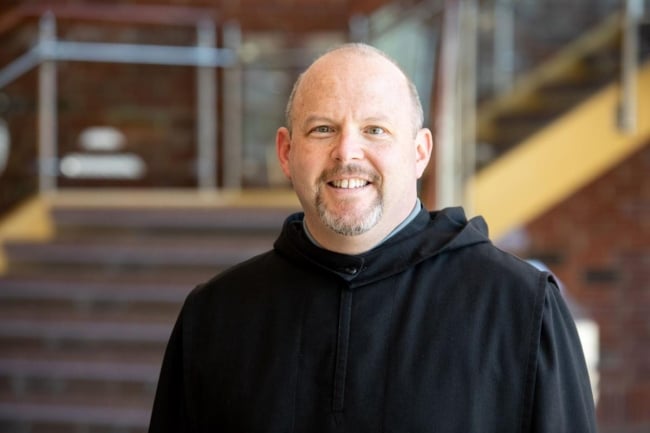You have /5 articles left.
Sign up for a free account or log in.

The Reverend Paul Taylor
Saint Vincent College
Saint Vincent College, in Pennsylvania, announced a new policy for speakers at college-sponsored events after a speech last week was called racist by many who heard it.
The Reverend Paul Taylor, president of the college, announced the new policy in a statement Tuesday. He said the college would have “a formal speaker’s policy for all public presentations sponsored by the college. The president and cabinet members will now approve all sponsored speakers to make sure that the message to be delivered is not in conflict with the spirit and mission of the college.”
The speech was by David Azerrad, an assistant professor at Hillsdale College, a private liberal arts institution in Michigan (although he teaches in Washington, D.C.), and is posted on YouTube. In the beginning of the speech, Azerrad said that Kamala Harris is vice president only because her father is from Jamaica.
“For all the talk of white privilege,” he said, “the real color of visible privilege is Black.” Black people are privileged in American society, followed by women, he said.
He noted that many publications and people spell Black with an uppercase “B.”
“Standards are continuously lowered” in education for Black people, he said, including the move to eliminate the SAT and ACT as a requirement for college admissions.
And citing the criticism of many of the criminal justice system as racist, he asked, “Are we more committed to real justice or to social justice?”
His overall focus was reflected in the speech’s title—“Black Privilege and Racial Hysteria in Contemporary America.” The speech was part of a two-day conference, Politics, Policy and Panic: Governing in Times of Crisis. It was sponsored by the college’s Center for Political and Economic Thought.
Father Taylor initially issued a statement that did not reference the speech but condemned racism.
In his latest statement on the speech, Father Taylor said, “The speaker’s remarks contravened our core principles … Rightfully, many in our community, particularly our students, were deeply upset by these remarks. I affirm the April 10th statement of Dr. Gary Quinlivan, dean of the McKenna School, who denounced this lecture. I also denounce this lecture and I am sorry that this happened at Saint Vincent. The tenets of Academic Freedom—academic rigor and reasoned analysis—are treasured here. Faculty and students are encouraged to explore, discuss and responsibly debate topics and be inspired to search for truth in our classrooms, and on our campus. Our community, however, will not allow the platform of our college to be used to promote a message contrary to our mission.”
Quinlivan, dean of the McKenna School of Business, said in his statement, “Saint Vincent does not endorse the promulgation of any point of view which may be interpreted as a form of invidious discrimination which inherently degrades the sanctity of human life. We are an institution which has served our community for over 175 years and, in that time, we know that the country has struggled to overcome systemic bigotry against many people. While we have seen much success in this regard through the prayers and earnest efforts of many people of all races, religions and backgrounds, we know that the evolution of the human race to a point where bigotry is confined to the pages of history has many miles yet to travel. As we believe that all human life shares the common bond of being Children of God, we will do all in our power to help that evolution in our society and in the hearts of each person we seek to serve.”
He added, “The examples used during the lecture by Dr. Azerrad including those which downplayed and minimized the role of several highly accomplished African Americans including George Washington Carver, the women who played a strategic role in the mathematics underlying the early launches of NASA, and his theory as to why Kamala Harris was selected as vice president on the basis of her standing solely as an African American woman were demeaning in many ways.”
Azerrad denied the speech was racist. In an email to Inside Higher Ed (before the new policy was announced), he said, “You have seen a version of this unfold an untold number of times on our college campuses: a speaker says something perfectly sensible on race (in my case, a defense of colorblindness and a denunciation of preferential treatment), most in attendance are in full agreement, a handful disagree loudly (albeit without offering any counterarguments beyond their indignation that someone deviated from the accepted script when talking about race), and the university administration cowers before their indignation.”
Alex Morey, director of the individual rights defense program at the Foundation for Individual Rights in Education, said via email, “The college itself can absolutely disagree with the speaker, condemn it, hold town hall meetings, or further discuss the issue however they wish. Facilitating conversation about divisive issues is exactly the role of a university that promises academic freedom. What Saint Vincent cannot do is clamp down on faculty rights, which are the exact same rights that protect the ability to criticize this kind of controversial speech, and prevent discussion or debate from happening in the first place. The choice of which speakers to bring to campus in this case lies with faculty, not controversy-shy administrators.”




